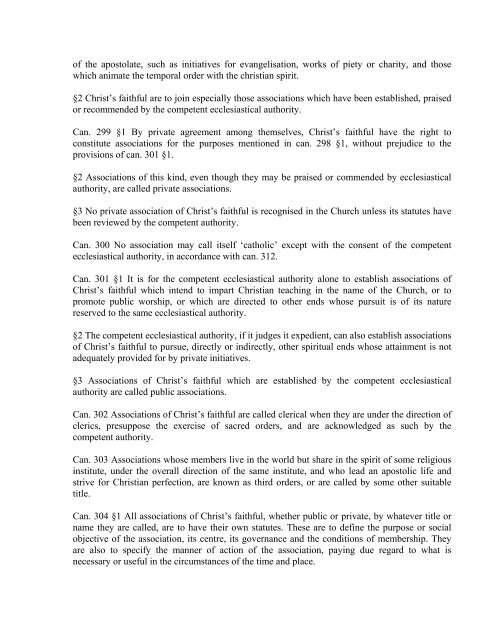Code_of_Canon_Law
Code_of_Canon_Law
Code_of_Canon_Law
Create successful ePaper yourself
Turn your PDF publications into a flip-book with our unique Google optimized e-Paper software.
<strong>of</strong> the apostolate, such as initiatives for evangelisation, works <strong>of</strong> piety or charity, and those<br />
which animate the temporal order with the christian spirit.<br />
§2 Christ’s faithful are to join especially those associations which have been established, praised<br />
or recommended by the competent ecclesiastical authority.<br />
Can. 299 §1 By private agreement among themselves, Christ’s faithful have the right to<br />
constitute associations for the purposes mentioned in can. 298 §1, without prejudice to the<br />
provisions <strong>of</strong> can. 301 §1.<br />
§2 Associations <strong>of</strong> this kind, even though they may be praised or commended by ecclesiastical<br />
authority, are called private associations.<br />
§3 No private association <strong>of</strong> Christ’s faithful is recognised in the Church unless its statutes have<br />
been reviewed by the competent authority.<br />
Can. 300 No association may call itself ‘catholic’ except with the consent <strong>of</strong> the competent<br />
ecclesiastical authority, in accordance with can. 312.<br />
Can. 301 §1 It is for the competent ecclesiastical authority alone to establish associations <strong>of</strong><br />
Christ’s faithful which intend to impart Christian teaching in the name <strong>of</strong> the Church, or to<br />
promote public worship, or which are directed to other ends whose pursuit is <strong>of</strong> its nature<br />
reserved to the same ecclesiastical authority.<br />
§2 The competent ecclesiastical authority, if it judges it expedient, can also establish associations<br />
<strong>of</strong> Christ’s faithful to pursue, directly or indirectly, other spiritual ends whose attainment is not<br />
adequately provided for by private initiatives.<br />
§3 Associations <strong>of</strong> Christ’s faithful which are established by the competent ecclesiastical<br />
authority are called public associations.<br />
Can. 302 Associations <strong>of</strong> Christ’s faithful are called clerical when they are under the direction <strong>of</strong><br />
clerics, presuppose the exercise <strong>of</strong> sacred orders, and are acknowledged as such by the<br />
competent authority.<br />
Can. 303 Associations whose members live in the world but share in the spirit <strong>of</strong> some religious<br />
institute, under the overall direction <strong>of</strong> the same institute, and who lead an apostolic life and<br />
strive for Christian perfection, are known as third orders, or are called by some other suitable<br />
title.<br />
Can. 304 §1 All associations <strong>of</strong> Christ’s faithful, whether public or private, by whatever title or<br />
name they are called, are to have their own statutes. These are to define the purpose or social<br />
objective <strong>of</strong> the association, its centre, its governance and the conditions <strong>of</strong> membership. They<br />
are also to specify the manner <strong>of</strong> action <strong>of</strong> the association, paying due regard to what is<br />
necessary or useful in the circumstances <strong>of</strong> the time and place.












![[Pham_Sherisse]_Frommer's_Southeast_Asia(Book4You)](https://img.yumpu.com/38206466/1/166x260/pham-sherisse-frommers-southeast-asiabook4you.jpg?quality=85)




